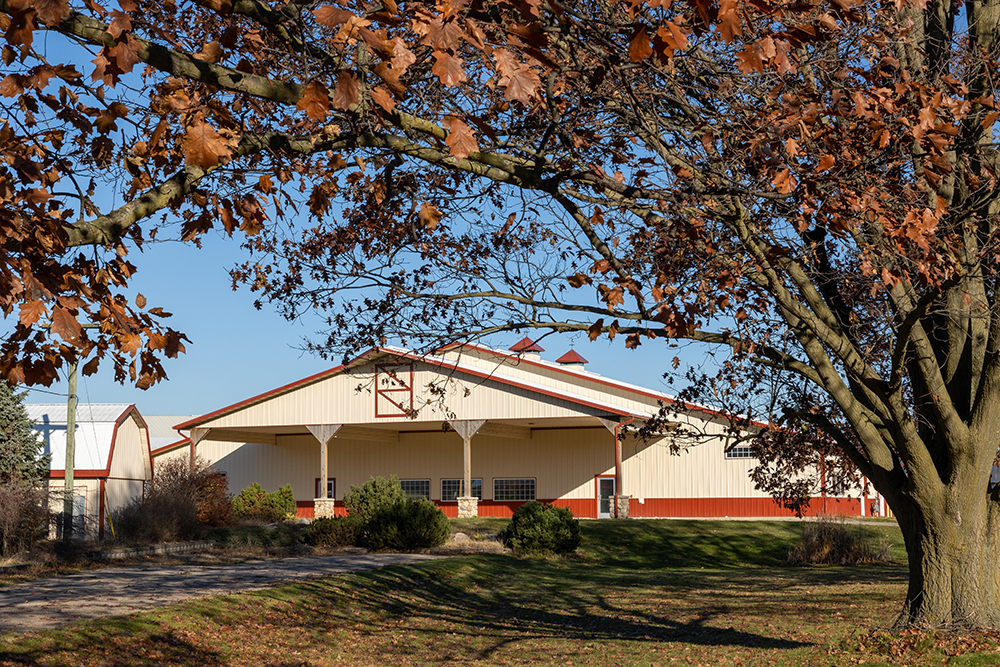
The Andrews University Agriculture Education Center; photo by Jeff Boyd
On October 11, 2023, the Department of Sustainable Agriculture at Andrews University achieved Michigan Agriculture Environmental Assurance Program (MAEAP) certification for its livestock system at the Agriculture Education Center. The education center is now among five percent of farms in Michigan to have earned this certification.
The MAEAP program is operated by the Michigan Department of Agriculture & Rural Development (MDARD). It consists of a voluntary certification process that aims to prevent and minimize agricultural pollution risks in farms across Michigan. According to the program website, “MAEAP-verified farms keep their land, water and air as healthy as the food they produce. They represent the highest stands of environmental stewardship and the pinnacle of responsible agriculture.”
“We want to witness to our community that we care deeply about the land, water and animals we are given custody of during the time we are here,” says Katherine Koudele, chair of the Andrews University Department of Sustainable Agriculture. She believes the certification aligns with the university’s mission to seek knowledge, affirm faith, and change the world, noting, “By improving the quality of the land and water that has been given to us, we feel that we are changing the world a little bit at a time. The students that study here will be able to learn these practices and utilize them after they go to other parts of the world.”
Agriculture has long been an important aspect of both Andrews University and its predecessor, Emmanuel Missionary College. The first students of the department of agriculture graduated in 1918. In recognition of changing practices within the field, the Department of Sustainable Agriculture was renamed and reintroduced in 2015 in accordance with its motto, “Educating Earth’s Caretakers.” When the Andrews University dairy closed in 2018, many of its facilities were then repurposed into the agriculture education center within the department of sustainable agriculture.
The agriculture education center is home to a wide variety of animals, including cattle, chickens, sheep, rabbits, pigs and goats. Although many proper management guidelines were already in place, the education center team used the departmental transition to implement new practices.“We wanted to follow a different model of animal agriculture than the one the dairy followed, which would mean fewer animals and for them to have as much access to pasture as possible,” explains Koudele. “We are following environmentally friendly practices such as rotational grazing … and free range pasture.”
In accordance with these goals, the three-month MAEAP certification process began in July 2023. The farm was evaluated based on categories such as manure and nutrient management, land application, record keeping, feed storage and lot management. Multiple soil samples were collected and farm operation details were assessed, all with the central goal of preventing pollution and runoff into the nearby St. Joseph River. In October, a verifier from the Michigan MDARD state office completed a final inspection and approved the certification for the farm’s livestock system. The MAEAP certification affirms the University’s commitment to practicing good stewardship of Michigan’s land, water and animals.
“We felt that this certification would be one more piece of evidence of our determination to maintain and continue to develop environmentally friendly practices,” Koudele expresses. “We believe that properly caring for the Earth is a God-given mandate, and we want to be an example and leader in obeying this mandate.”
In the future, the department plans to continue pursuing sustainability through other environmentally conscious practices and related certifications. “We plan to keep managing the agriculture education center the way we have been and that will keep us in compliance with the certification requirements,” says Koudele. “We will be reviewed every five years to assure that we are maintaining our certification.”
To learn more about the department of sustainable agriculture, click here.
— Isabella Koh is an Andrews University Communication writer.
